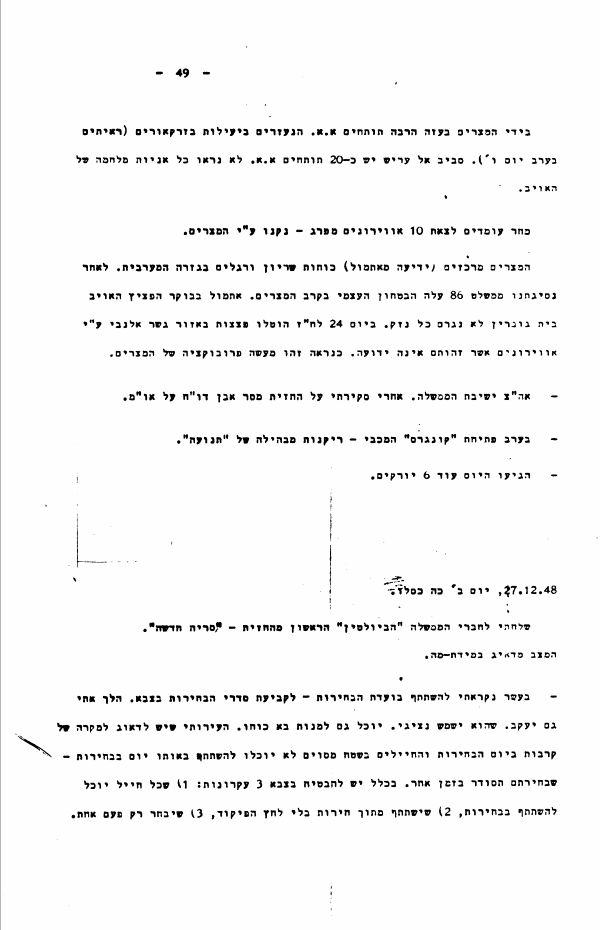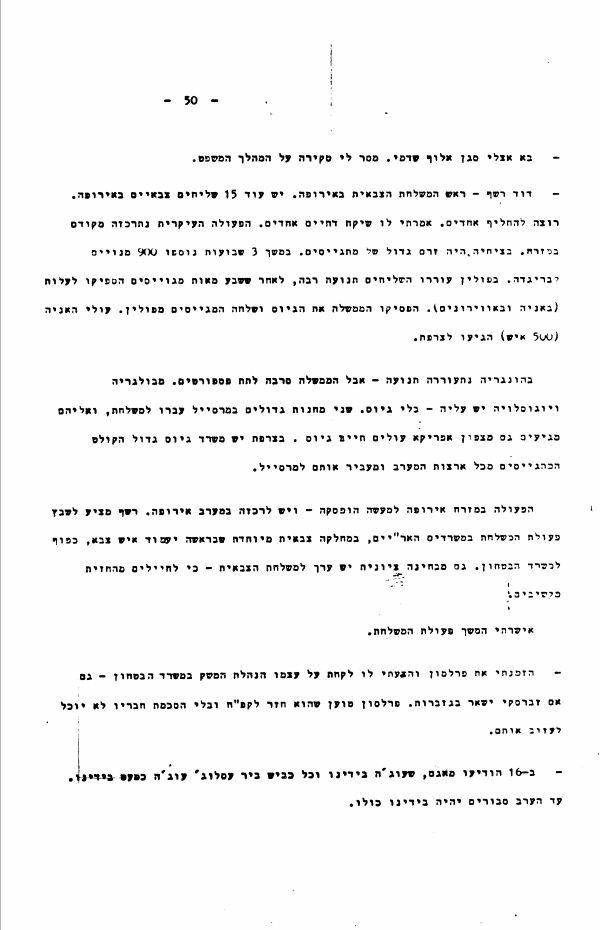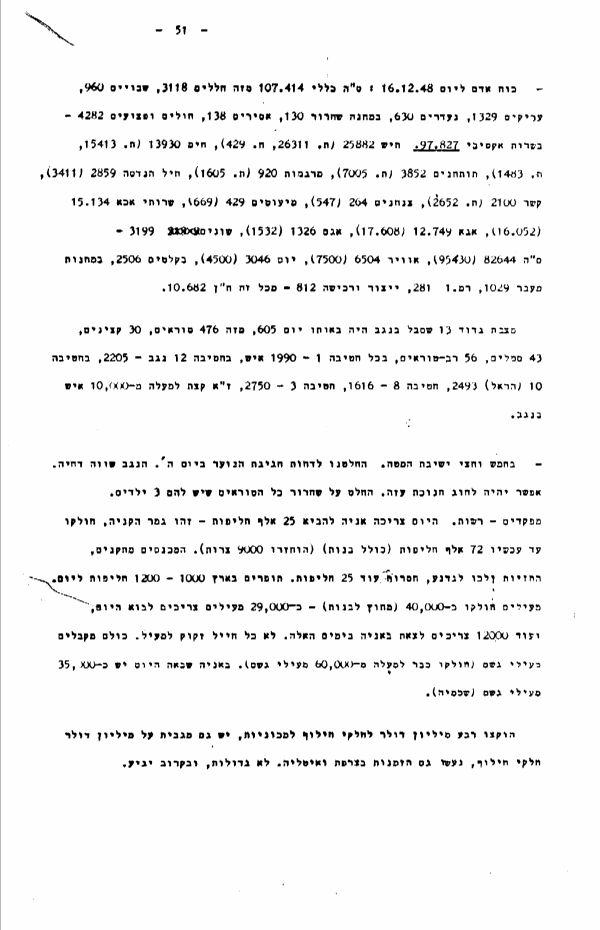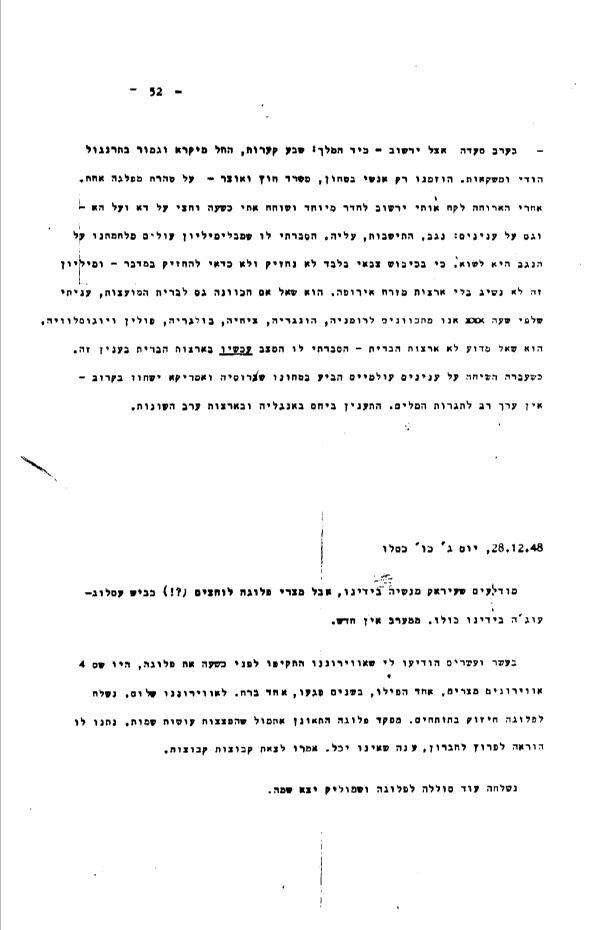1
of
Places:
England
United States
Bulgaria
France
Bir Asluj
Gaza
Romania
Czechoslovakia
Yugoslavia
Turkey
The use of the photograph is subject to the Copyright Law, 2007
27.12.1948
223456
Monday, December 27, 1948 I sent the government members the first “bulletin” from the front – “a new series.” The situation is somewhat worrying. – At 10 I was summoned to participate in the elections committee – to determine election arrangements for the army. Ya’akov [Dori], who will serve as my representative, also came with me. He can also appoint someone to act on his behalf. I commented that [we] need to consider the possibility of hostilities on election day, and that soldiers in a particular area won’t be able to participate in the elections on that day – to make arrangements for them to vote another time. In general 3 principles have to be guaranteed in the army: 1) that every soldier is able to participate in elections, 2) that he be able to vote freely, without pressure from the command, 3) that he only vote once. – Lieutenant Colonel [Nahum] Shadmi came to see me. He gave me a review of the judicial action [against LEHI leaders]. – David Reshef – head of the military delegation in Europe. There are another 15 military delegates in Europe. He wants to replace some of them. I told him to take a few religious individuals. Previously activity was mainly concentrated in the East. In Czechoslovakia there was a large influx of recruits. Over the course of 3 weeks an additional 900 registrants were added to the [Czech] Brigade. In Poland the delegates sparked a lot of movement. After 700 recruits managed to set out [for Israel] (by ship and airplanes), the government suspended enlistment and had the recruiters leave Poland. Those who boarded the ship (500 men) reached France. In Hungary movement was sparked – but the government refused to grant passports. There’s ‘aliya from Bulgaria and Yugoslavia – without enlistment. Two large camps in Marseilles were transferred to the delegation, and immigrants from North Africa who are subject to conscription are joining them. There’s a large recruitment center in France that’s receiving recruits from all the Western countries and transferring them to Marseilles. The activity in Eastern Europe has effectively stopped – and it should be concentrated in Western Europe. Reshef proposes merging the delegation’s activity with the Eretz-Israeli offices, in a special military department headed by a military figure, subordinate to the Defense Ministry. From a Zionist perspective there’s also value to the military delegation – because [people] listen to soldiers from the front. I authorized the delegation to continue its activity. – I summoned Perlson [Eliezer Peri] and suggested that he assume responsibility for handling the economy [finances and logistics] in the Defense Ministry – even if Zabrasky remains in the treasury. Perlson asserts that he returned to Kupat Holim [the healthcare network] and without his associates’ consent, he can’t leave them. – At 4 p.m. the Operations Department reported that ‘Auja is in our hands and the entire Bir-‘Isluj – ‘Auja road is nearly in our hands. By evening, they think, all of it will be in our hands. – Manpower as of December 16, 1948: overall total 107,414 of whom [there were] 3,118 fallen, 960 POWs, 1,329 deserters, 630 missing, 130 in discharge camp, 138 prisoners, 4,282 ill and wounded – in active service 97,827. Hayish 25,882 (st. [standard] 26,311, sh. [shortfall] 429), garrison 13,930 (st. 15,413, sh. 1,483), artillery corps 3,852 (st. 7,005), mortars 920 (st. 1,605), engineering corps 2,859 (3,411), signal 2,100 (st. 2,652), paratroopers 264 (547), minorities 429 (669), Personnel Department services 15,134 (16,052), Logistics Department 12,749 (17,608), Operations Department 1,326 (1,532), miscellaneous 3,199 – total 82,644 (95,430), Air [Force] 6,504 (7,500), Navy 3,046 (4,500), in intake [facilities] 2,506, in transit camps 1,029, R.M. 1 [reshima mekubetzet? i.e., collective list, a military unit without a manpower standard (quota) that comprises soldiers temporarily not being counted in other units as part of those units’ standard] 281, production and procurement 812 – of all the above WC [Women’s Corps) 10,682. The available manpower of Battalion 13, which suffered [losses] in the Negev, was 605 on that day, of whom [there were] 476 privates, 30 officers, 43 sergeants, 56 corporals. The entire [available manpower of] Brigade 1 [Golani] – 1,990 men, in Brigade 12 – Negev – 2,205, in Brigade 10 – Harel – 2,493, Brigade 8 [Armored Brigade] – 1,616, Brigade 3 [Alexandroni] – 2,750, that is, slightly more than 10,000 men in the Negev. – At 5:30 [General] Staff meeting. We decided to postpone the youth celebration on Thursday [December 30]. The Negev is worth postponement. [We’ll] be able to celebrate the Hanukkah [also “inauguration” – i.e., conquest] of Gaza. [We] decided to discharge all the privates who have 3 children. Commanders – optional. Today a ship is supposed to bring 25,000 uniforms – this is the last of the purchase, so far 72,000 uniforms have been distributed (including girls) (9,000 [that were too] tight were returned). The pants are being mended; the [military] tunics will go to Gadna [Youth Battalions]; [we’re] short 25 [thousand] uniforms. 1,000-1,200 uniforms are being sewn daily in the country. About 40,000 coats were distributed (aside from girls) – about 29,000 coats are supposed to arrive today, and another 12,000 to be sent by ship in the coming days. Not every soldier needs a coat. Everyone receives a raincoat (more than 60,000 raincoats have already been distributed). There are about 35,000 raincoats (cape[s]) on the ship that’s arriving today. A quarter million dollars have been allocated for spare parts for vehicles; there’s also a fundraising campaign for $1 million for spare parts. Orders were also placed in France and Italy. Not large ones, and they’ll arrive soon. – Dinner at [the residence of Soviet Ambassador Pavel] Yershov – [a meal] fit for a king: seven dishes, beginning with ikra [fish eggs] and concluding with turkey and drinks. Only Defense [Ministry], Foreign Ministry, and Finance [Ministry] personnel were invited – purely one party [Mapai]. After the meal Yershov took me to a special room and spoke with me for about an hour and a half about this and that – and also about substantive issues: Negev, settlement, ‘aliya. I explained that without a million immigrants our war over the Negev is for nothing. Because through military occupation alone we will not hold onto, and it is not worthwhile that we hold onto, the Negev – and we will not achieve this million without Eastern European countries. He asked if this refers to the Soviet Union as well, [and] I replied that at the moment we mean Romania, Hungary, Czechoslovakia, Bulgaria, Poland, and Yugoslavia. He asked why not the United States – I explained the current situation in the United States in this regard. When the conversation shifted to global affairs, he expressed confidence that Russia and America will reach a compromise soon – there isn’t much substance behind the verbal confrontation [the Cold War]. The matter is different with regard to England and the various Arab countries.












